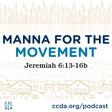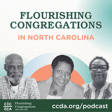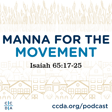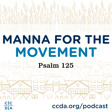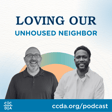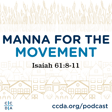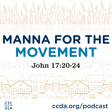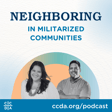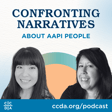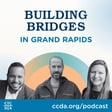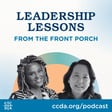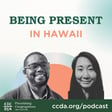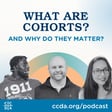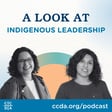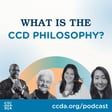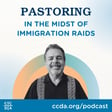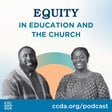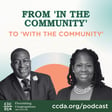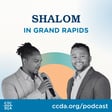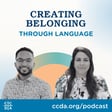Introduction to CCDA Podcast and Journey to Justice
00:00:03
Speaker
Welcome to the CCDA podcast.
00:00:05
Speaker
In this episode, Sam Heath and Jami Hodge talk about Journey to Justice, advocacy that moves beyond the criminal legal system and builds what we
Context: Locked in Solidarity Week and Mass Incarceration
00:00:15
Speaker
We join them for their workshop.
00:00:18
Speaker
All right, good afternoon, good morning, everybody, and welcome.
00:00:21
Speaker
So this is a session through CCDA, Christian Community Development Association's LIS Week, so Locked in Solidarity.
00:00:28
Speaker
It is an annual week-long focus on what does it look like to equip Christians and churches within them to engage mass incarceration, to respond to it, to end it, to live within
Theme: Advocacy Beyond the Criminal Legal System
00:00:39
Speaker
And so this event specifically we've called Journey to Justice, Advocacy that Moves Beyond the Criminal Legal System and Builds What We Need.
00:00:47
Speaker
And so I'm here with my friend and colleague, Jami Hodge, and we'll intro ourselves in a second to talk about those things.
00:00:55
Speaker
So what that'll look like for us today is going to be about 40 or 45 minutes of us having a conversation with each other and through that and sharing with you all about what our journey to justice has been.
00:01:07
Speaker
and then saving some time at the end for you all to ask questions.
00:01:10
Speaker
You can feel free to put those in the chat.
00:01:13
Speaker
And if you don't want to forget them or to save those at the end, and at the end, we'll also be able to see everybody and you can come off mute and talk live if you would want, but we'll make sure to save some time at the end chat with you all.
Opening Prayer
00:01:27
Speaker
And then we'll start with Jami introducing yourself and then I'll say that and then we'll dive in.
00:01:32
Speaker
But we are really glad that you all are here.
00:01:35
Speaker
Father, we're grateful that you've given us the space in this time.
00:01:39
Speaker
Thank you for the work of CCDA and John Perkins and all of those that have been involved in the specifics of Lockton Solidarity Week.
00:01:45
Speaker
We pray for those who are incarcerated that you would bring freedom in all the ways that those individuals need it and that you would equip those of us on the outside to care for them, to care for and to think about the system that stands and what changes need to be made.
00:01:59
Speaker
We pray that you would equip your church to love our neighbors well.
00:02:03
Speaker
We pray for this time in this space that our conversation would flow and be engaging and be exciting and be provocative and that it would help people think deeply and ultimately that it would help us love you and love others well.
00:02:14
Speaker
Thank you for this time in this space.
00:02:19
Speaker
Well, John, we want you to say hey first and then I'll go in after you.
00:02:23
Speaker
Yeah, thank you, Sam.
00:02:24
Speaker
And thank you everyone for coming.
00:02:26
Speaker
We are really excited just to be sharing the space with you today.
Jami Hodge's Journey to Understanding Systemic Issues
00:02:30
Speaker
And I, in introducing myself, I'm going to kind of share in a way that is aligned with the theme of the conversation.
00:02:37
Speaker
So a little bit about my background that has led me to being here at EJUSA, where I have the distinct privilege of serving as our executive director
00:02:48
Speaker
of an incredible organization and team trying to make a difference in the world.
00:02:53
Speaker
So a little bit about my background is I am a lawyer by training.
00:03:01
Speaker
I'm originally from Detroit.
00:03:02
Speaker
I'm zooming in here from just outside of Washington, D.C.,
00:03:07
Speaker
And I spent many years working inside the criminal legal system as a prosecutor.
00:03:11
Speaker
I'm always clear in talking about that, that I went in with eyes open.
00:03:17
Speaker
So, you know, when I, when it was suggested to me by a mentor that I think about the prosecutor's office, I initially was surprised and thought, you know, my experience growing up in Detroit as a black person
00:03:32
Speaker
was police and the system was something to be afraid of, something to be careful around.
Diverse Power Holders in the Criminal Legal System
00:03:42
Speaker
Even by that point, as a young lawyer, I already had cousins who were incarcerated.
00:03:49
Speaker
took me a minute to think about do I want to be part of something that I think of as often causing harm.
00:03:57
Speaker
And what I decided was, you know, well, if the system is broken, which is what I thought at the time, that it's important for some of the power holders, and I do think prosecutors are some of the most powerful people who operate in the system, to be people like me who come from my background as, you know,
00:04:15
Speaker
first sent my family to graduate college and certainly go to law school, who saw firsthand that the system isn't always fair and often is harmful to black and brown communities.
00:04:27
Speaker
And so I went in thinking, okay, if you get the right people, you know, who understand what this power does and how it can be used differently.
00:04:34
Speaker
The other piece was, it was my first opportunity to learn about things like diversion and problem solving courts and that, oh,
00:04:41
Speaker
prosecutors can use their discretion to do something other than send people to jail or prison.
00:04:47
Speaker
But I will say what I learned in my 12 years of serving in that role and in some other roles tied to the system or tied to criminal justice more broadly was that I eventually came to the conclusion that the system actually wasn't broken.
Systemic Change Beyond Traditional Roles
00:05:08
Speaker
And the more I learned
00:05:09
Speaker
particularly in my later years, made me really reach the conclusion that through a lens of history, which I think is incredibly important when we talk about this work, it helped me understand that there was intentionality in how the system was created and how it operates.
00:05:26
Speaker
And I'm looking forward to us talking a little bit more about that.
00:05:33
Speaker
I was working as a prosecutor just in D.C., not far from here.
00:05:38
Speaker
I left there to then lead a work, done some criminal justice policy roles in the Obama administration, which actually gave me the lens to understand that these problems were broad, not just in the courtroom that I practiced in, that there were real policy implications and policy that drove a lot of what you see happening inside the court system.
00:06:03
Speaker
And then had the chance to go to the Vera Institute of Justice to found and lead a program that essentially was to work with prosecutors who had been elected on platforms of change.
00:06:12
Speaker
So they ran on platforms of ending mass incarceration, addressing racial disparities, making prosecutors offices more transparent.
00:06:20
Speaker
And my job was to create a program and build a team to help make those campaign promises real.
00:06:27
Speaker
thought at that time that clearly all of my professional experiences and some of the personal ones had been to prepare me for that role, to really help prosecutors go from being this traditional law and order shop to seeing their role differently.
00:06:43
Speaker
But the one thing that I would come up against me and my team was violence.
00:06:48
Speaker
There'd be a willingness to try different policies if it was
00:06:52
Speaker
bail reform or increasing diversion, as long as we were talking about low level nonviolent things.
00:06:57
Speaker
But anytime the issue of violence came up, the answer was always just to punish.
00:07:02
Speaker
And then the tools, there was not a willingness to change the tools or the approach.
00:07:07
Speaker
And that is what really drew me to EJUSA.
00:07:11
Speaker
And, you know, I look forward to talking a little bit about our work and really how we know that we're never going to end mass incarceration.
Sam Heath's Background and Personal Connection
00:07:19
Speaker
We're never going to have the safe communities
00:07:22
Speaker
that we want or world that we envision where violence is rare, unless we address violence and address those drivers of violence and do it very differently.
00:07:31
Speaker
So I'll stop there.
00:07:32
Speaker
That's probably a longer intro than I intended.
00:07:34
Speaker
And Sam, I look forward to you sharing about your journey.
00:07:38
Speaker
Yeah, that's great.
00:07:39
Speaker
And I feel people pick this up already, but Jami and I both work at Equal Justice USA.
00:07:44
Speaker
And so she's our executive director and my role with it is engaging Christians and churches.
00:07:49
Speaker
So my name is Sam Heath and I live in Charlottesville, Virginia, and I've been here for about 10 years.
00:07:54
Speaker
And my background is that I was a high school history teacher for a decade and taught in high schools in North Carolina and here in Virginia.
00:08:03
Speaker
And through a through
00:08:04
Speaker
a couple paths came into this criminal legal system world and this work.
00:08:10
Speaker
One path of it was through teaching and through teaching about the history of Europe and the US, which is what I specialized in.
00:08:16
Speaker
I saw, as my wife says, she uses the term that she felt bamboozled in the way that we were raised and what we didn't know and what we were not taught about, especially what it meant to be white and Southern and for me male and what those things meant in the history of those labels and the impact of those in spaces.
00:08:32
Speaker
And so as I increasingly learned what that meant, I wanted to share and to teach that.
00:08:36
Speaker
And the more I taught that, the more I wanted to more than just teach it, though that's key to equip others to live in light of those things.
00:08:43
Speaker
But the criminal legal system space really came through.
00:08:46
Speaker
One of my best friends was arrested and was put in prison for 13 years.
00:08:50
Speaker
And we were friends before his incarceration, during it and after.
00:08:54
Speaker
through visiting him all over North Carolina at different prisons.
00:08:56
Speaker
It was my first time in prisons and seeing what they are and seeing exactly what Jami said.
00:09:02
Speaker
I'm glad, so glad, Jami, you already brought this up that I no longer say the system is broken either.
00:09:07
Speaker
I think the system and by the system, I mean the criminal legal system, all pieces of punishment, police and prisons, all of that.
00:09:14
Speaker
I think it's constructed, as you said, with intentionality and that it's effective at doing what it wants to do to whom it wants to do it to for the benefit of those that it wants to benefit.
00:09:23
Speaker
And so in light of that, the system is actually working by the measure of its intention.
00:09:28
Speaker
Then that made me think of how do I live in light of that?
00:09:31
Speaker
Now that I've seen through the eyes of my friend what prison is and what it can't do, how it has a cookie cutter response to all people and all forms of violence without being able to bring any form of nuance or humanity to it.
00:09:43
Speaker
And then being in Charlottesville during the Unite the Right rally in 2017, that catapulted our family into a place of what do we do?
00:09:51
Speaker
And then it was really during the uprisings of 2020 when I first said out loud, I would love to be in a space of the criminal legal system and what does advocacy look like there?
00:10:00
Speaker
And so about two years ago, I was able to find and apply to EJUSA.
00:10:05
Speaker
And my role specifically is I'm the manager of what's called our Evangelical Network.
00:10:10
Speaker
So EJUSA is not a faith-based group, but often the way I describe it to people, as I say, we're a national organization.
00:10:15
Speaker
We're working to repeal the death penalty and to help communities respond to violence without centering punishment, police, or prisons.
00:10:23
Speaker
And my role within that is to especially equip and accompany evangelical churches, denominations, groups, Christians as a whole, but especially evangelicals in that journey.
00:10:33
Speaker
What does it look like to...
00:10:35
Speaker
not only reform the system, though there are aspects of that that are important, but to build something else, holding new responses to violence, as Jami was saying, and to work towards a world where violence
Prosecutors' Power and Systemic Issues
00:10:46
Speaker
So I've been with the organization a little less than two years and have known of CCDA and engaged it for about 15 or so years.
00:10:54
Speaker
And I'm so thankful for this platform to process and discuss all of these things.
00:11:01
Speaker
John, one thing I want to ask you about what you said, because this, I think, will give some more space for you to tease out your story.
00:11:07
Speaker
You talked about how you saw the level of power that prosecuting attorneys have.
00:11:13
Speaker
One, like, what do you mean by that?
00:11:15
Speaker
What does that look like?
00:11:18
Speaker
How did you process that kind of as you came to see the level of power, I think, greater than any other role within the system that prosecutors have?
00:11:26
Speaker
And how is that imbalance of power for prosecutors itself a reflection of some of the problems of the system?
00:11:35
Speaker
I think sometimes people are surprised when I say that because you think of judges, right?
00:11:41
Speaker
If you think of who's the power holder, they wear the black robe.
00:11:44
Speaker
We all stand when they enter.
00:11:47
Speaker
But the reason I say that it's prosecutors is because essentially prosecutors are the gatekeepers of the system.
00:11:55
Speaker
So when if you think of the police as being the entry point, because that is usually for most people, the entry point, it's through arrest or through some long term investigation that involves police or other forms of law enforcement agents or things like that.
00:12:12
Speaker
Ultimately, the decision whether or not for whatever that incident is to move into the system lies with the prosecutor.
00:12:19
Speaker
In most cases, there's there are a couple of exceptions, but in most cases,
00:12:24
Speaker
when that arrest happens, that case is then presented to a prosecutor.
00:12:28
Speaker
And it's a prosecutor who's looking with an eye, first legally, like, you know, for what this person's arrested for, what this officer's asking them to be charged for, can you legally make it out?
00:12:39
Speaker
But a prosecutor also has a broader sort of ethical responsibility.
00:12:42
Speaker
So maybe if the case can be proved legally, if the reason they have the evidence was because of an illegal search, the police violated a constitutional right in discovering the evidence,
00:12:53
Speaker
then there's a responsibility to dismiss, to not bring that case, even if you know you've got the person and they did the thing.
00:12:58
Speaker
And that discretion that prosecutors have as gatekeepers is largely sort of untouched.
00:13:09
Speaker
They're given this authority, they're given this responsibility and there's not any oversight really.
00:13:16
Speaker
And so if you think about particularly the size of our system, we have,
00:13:22
Speaker
our system is so big.
00:13:24
Speaker
It's 2 million people who are incarcerated.
00:13:27
Speaker
We have just the amount of money that we spend.
00:13:30
Speaker
Our police budgets alone are in the, it's 118 billion was the last number I saw.
00:13:37
Speaker
And that's, by comparison, if you think billion with a B, countries like Japan, Germany spend less than half of that on their military.
00:13:46
Speaker
So that just helps put that in a perspective.
00:13:50
Speaker
When you have a gatekeeping role and you can help decide what comes in and out, that can be very impactful.
00:13:55
Speaker
The other reason why prosecutors have so much power is because they decide what charges to bring.
00:14:02
Speaker
And sometimes those charges
Adversarial System vs. Christian Values
00:14:04
Speaker
will take power away from judges.
00:14:06
Speaker
So if you think about mandatory minimums, where you're charged with a certain offense and that offense carries a mandatory sentence,
00:14:15
Speaker
If you prove that conviction or the person pleads to it, there is nothing a judge can do.
00:14:19
Speaker
Like they are bound by that law.
00:14:22
Speaker
And that is another power that lies with the prosecutor.
00:14:26
Speaker
And, you know, just they control like what's coming in and how it's coming in as a misdemeanor, as a felony, you know, as something with a mandatory minimum.
00:14:38
Speaker
So the power there is real.
00:14:40
Speaker
I think I thought, you know, that having someone who was closer to these issues, both, you know, in my personal experience, I'd had my father was the victim of a robbery, an armed robbery that left him with a closed head injury when I was in high school.
00:14:58
Speaker
So I'd seen that impact.
00:15:00
Speaker
which not just him, but our entire family, because he still lives with those with the implications, the consequences of what happened to him, even to this day.
00:15:11
Speaker
I'd seen violence up close.
00:15:13
Speaker
And then, you know, my brother had been in the system behind a substance use disorder that really came out of the trauma of my father's attack.
00:15:23
Speaker
seeing how the system, you know, what happened to him was incarceration, periods of solitary confinement, you know, and all of, and kind of understanding our, the way we approach doesn't work.
00:15:36
Speaker
Oh, there's these other things that a prosecutor can do.
00:15:39
Speaker
They can dismiss, you know, they can divert out and get treatment for things.
00:15:46
Speaker
But in reality, what I realized is those options are very small.
00:15:51
Speaker
it's so few cases that actually are qualified.
00:15:55
Speaker
There are a lot of qualifications to be able to get something other than punishment as a response.
00:16:00
Speaker
And that essentially, if you think about how the system was founded, and I'll talk a little bit about that, just because I think this history is important.
00:16:11
Speaker
And there's a big movement around this right now that's called abolish the exception.
00:16:16
Speaker
But if you think about the 13th Amendment and Sam, I know you know this well, but it
00:16:21
Speaker
abolish slavery except as punishment for crime.
00:16:24
Speaker
You know, so when we talk about in our work at EJUSA, how deeply rooted the system is, there's a direct connection between our legacy of slavery and that culture.
00:16:33
Speaker
If you think and you look at the history of policing, the root of policing were patrols to catch the enslaved, slave patrols.
00:16:43
Speaker
And so those things don't go away.
00:16:44
Speaker
They still exist at the culture, at the founding, at the root.
00:16:48
Speaker
And if we understand that history, then it actually isn't surprising when we see the racial disparities that exist, when we have black people making up 13 percent of the population, but 40 percent of those incarcerated.
00:16:59
Speaker
Or, you know, there's so many numbers literally that show that every almost decision discretionary point, there are disparities in terms of how it's black people are more likely to be stopped, more likely to be searched.
00:17:12
Speaker
more likely to be charged, more likely to face harsher charges, more likely to face longer sentences.
00:17:18
Speaker
Those discernities make sense when you understand that historical context.
00:17:25
Speaker
I feel like I probably should stop there just to.
00:17:28
Speaker
There's so much, right?
00:17:31
Speaker
In talking about prosecution, I think about how the system is set up intentionally to be adversarial, right?
00:17:36
Speaker
Like it is the state, this government against this individual.
00:17:40
Speaker
And it leaves out the survivor or the victim to really have a voice or a role, except to maybe be exploited by either side or re-traumatized and what's happening there.
00:17:51
Speaker
And so inherently it's set up in this way that for me as a Christian, as I learn more about the system was really problematic.
00:17:58
Speaker
I mean, the more that I saw in scripture, the more that I see what churches are called to is seeing crime, violence
Economic Impact and Racial Disparities
00:18:04
Speaker
And those are not always the same thing.
00:18:06
Speaker
But when some kind of harm happens to see it as communal in its effect.
00:18:10
Speaker
And if it's communal in its effect, then it is communal in its path towards healing.
00:18:14
Speaker
And that healing being the goal is what I saw wasn't possible through my friend, that he needed healing.
00:18:20
Speaker
And I'm hearing that with your brother and with your dad, like the system literally in their response made those things worse.
00:18:27
Speaker
And in the case of your brother almost led to that as a response to it, because the system has very few tools to respond to those things.
00:18:34
Speaker
And we talk about punishment, police and prisons or control or really under all of that, I think, is fear that's used as a tool.
00:18:42
Speaker
And the more I thought through scripture, especially when we think of the most often repeated command in the Bible is do not fear.
00:18:49
Speaker
And yet the cornerstone of the system is.
00:18:54
Speaker
And so that adversarial piece to me was more and more just incongruent with how I saw the Christian community being called to live.
00:19:02
Speaker
And it just, it wasn't tenable.
00:19:04
Speaker
And it made me want to, if you know the Enneagram, if not, it's fine.
00:19:08
Speaker
But as an Enneagram one, it just, it rose up my sense of justice and made me want to move into a space of, well, what can we do?
00:19:15
Speaker
And how can we as Christians especially move into that?
00:19:34
Speaker
talking more and more about what is it that we actually need?
00:19:37
Speaker
You know, we're kind of making a case that the system itself isn't equipped to do even what it says that it's able to do.
00:19:43
Speaker
But you gave some of those statistics, but what are some other ways or measures that we can have of our system to see that it's large and it has very few tools and its result is often division and fear and racism?
00:19:55
Speaker
Yeah, I mean, there's a ton of statistics.
00:19:59
Speaker
Before I list a couple, I just want to, the point you just made about
00:20:04
Speaker
not serving the person who's been harmed when victim survivor is just so important that I really want to underscore, particularly because for a lot of prosecutors and people involved in the system, if you ask them, why did they get involved in the system, police, prosecutors, others,
00:20:20
Speaker
it's often because they want to serve victims, you know?
00:20:25
Speaker
And I think that probably was one of the most eye-opening things to me as I, you know, kind of really began to step outside of the context of the courtroom and do my learning and zoom out and look in that my job actually wasn't, I didn't represent the victim.
00:20:38
Speaker
I represented the state and my job was to prove a conviction.
00:20:43
Speaker
And that actually came at the expense of what was best for the person who had been harmed.
00:20:49
Speaker
So, I mean, there are processes where you can force someone who doesn't want to, like they've been traumatized, they don't want to be involved.
00:20:58
Speaker
You can have them arrested and forced to testify.
00:21:02
Speaker
And that happens in the system, but people don't talk about that.
00:21:05
Speaker
But there's nothing about what the person who's been harmed needs is not the priority.
00:21:10
Speaker
It is to get the conviction and to punish.
00:21:12
Speaker
So I just wanted to underscore that.
00:21:15
Speaker
how much that's sort of a false understanding of what our system does, is that it gets justice for victims.
00:21:24
Speaker
And then just in terms of some of the numbers, I mean, we as a country hold about 5% of the world's population, but 20% of the incarcerated population.
00:21:38
Speaker
that just in terms of, you know, I shared a little bit about the number, the cost of the system in terms of policing budgets.
00:21:46
Speaker
I think not only is it big, but then how we punish, you know, the fact that we still have the death penalty in so many states when 70% of the world's nations have abolished it.
00:21:58
Speaker
And, you know, that we still have, not just that we have it, but then our system is so flawed and it has so much of that history that leads to
00:22:08
Speaker
racial bias and the racial disparities that we have people, we've had 190 people who've been exonerated, you know, who otherwise would have been put to death, you know, and there even this week, yesterday, we had an execution in Missouri of someone who has innocence claims.
00:22:27
Speaker
And there are the way our legal system is set up is the goal is finality.
00:22:31
Speaker
It's not about truth.
00:22:32
Speaker
It's not about innocence.
00:22:33
Speaker
It is how do we once with you've had your day in court,
00:22:37
Speaker
how do we make sure that that conviction sticks?
00:22:39
Speaker
Like that's the point of the system.
00:22:41
Speaker
So it's not just big, it is also just very dehumanizing.
00:22:50
Speaker
Like how people are incarcerated in our country is different than in other places.
00:22:56
Speaker
In other places, there is an understanding of
00:23:00
Speaker
true sort of redemption and rehabilitation and an understanding that most people who go in are coming home, which is the case here.
00:23:06
Speaker
95% of the people who are incarcerated are coming home here.
00:23:10
Speaker
It's just that because of our roots,
00:23:12
Speaker
in our legacy of slavery, when you are put in a system, they take your name, they give you a number, you get, you know, barely access to any real health care.
00:23:23
Speaker
It is everything, you know, exposure to violence and trauma, everything that is the shackling, you know, all of it, the removal from community, you know, you have to pay an arm and a leg just to make phone calls to be able to reach community, all of that.
00:23:38
Speaker
is a product of the dehumanization that's tied to our legacy of slavery.
00:23:43
Speaker
But I know we need to turn the conversation to really
00:23:49
Speaker
We understand there's a problem, but what can we do about it?
00:23:52
Speaker
The last thing I'll say, because it was where you ended, that Danielle Sered, who leads a group called Calming Justice, often talks about those drivers of violence.
00:24:01
Speaker
And we know what those are, right?
00:24:03
Speaker
We know that it's things like poverty.
00:24:05
Speaker
We know that it's things like racism and the disparity of the system and white supremacy.
00:24:09
Speaker
We know it's things like isolation.
00:24:10
Speaker
We know it's things like an environment of violence.
00:24:13
Speaker
All of those things, those four that I named, are within the system.
00:24:17
Speaker
To be put in prison is to experience those four things.
00:24:20
Speaker
So those individuals who are within the system often have experienced those already outside in the world and then re-experienced those within
Faith and Advocacy for Systemic Justice
00:24:27
Speaker
And as you said, 95% of people are sent out.
00:24:31
Speaker
So the system, at minimum, just seems ill-equipped to address those things.
00:24:36
Speaker
And it's why I'm so...
00:24:38
Speaker
excited and interested and burdened for churches and Christians to think about, well, how can or should we uniquely engage that?
00:24:45
Speaker
Another statistic that came to my mind is one out of 100 individuals within our country is involved within the system.
00:24:51
Speaker
And so individuals don't know or interact with people who are directly impacted by the system on a regular basis.
00:24:57
Speaker
One, we probably do, and we might not know it, but also we've really got to question what kinds of circles am I living in if I'm not engaging those that are encountered by the system.
00:25:06
Speaker
And we might need to go out of our way
00:25:08
Speaker
to encounter those individuals, right?
00:25:10
Speaker
Like I want people helping those that are in need as they go through life.
00:25:13
Speaker
I think like the parable of the Good Samaritan, but sometimes we have to seek that person and those individuals out.
00:25:19
Speaker
Yeah, I see in the chat that proximity is key, not just for those who've been out, but within the system, within prisons as well.
00:25:26
Speaker
Hi, my name is Christina Fore.
00:25:28
Speaker
And what I love about CCDA is that our faith is part of communities flourishing.
00:25:34
Speaker
Welcome to the CCDA podcast.
00:25:38
Speaker
Joni, what about what about this before we start talking about kind of what is advocacy and what does that look like?
00:25:43
Speaker
What are ways that your faith especially informs how you do this work?
00:25:48
Speaker
How in some ways is that inseparable?
00:25:50
Speaker
Yeah, I mean, well, it's it's just inseparable.
00:25:53
Speaker
because it's such a key part of who I am.
00:25:57
Speaker
And so I think whether, and I do believe I've been called to do the things I'm doing, like these were not, I did not have a plan, you know, really God has opened doors every single step of the way.
00:26:11
Speaker
And it's been clear to me that this is, this is a purpose I'm supposed to serve.
00:26:17
Speaker
So it's, it's always been deeply embedded in how I approach the work.
00:26:21
Speaker
you know, I'll tell you, even as a lying prosecutor, I prayed over sentencings because they were the hardest thing to, you know, particularly as I dealt with more serious cases.
00:26:31
Speaker
And it just that it was the hardest thing because the only options were incarceration and how much, you know.
00:26:38
Speaker
And so it's always been kind of at the forefront.
00:26:43
Speaker
But I think what excites me about CCDA and Lockton Solidarity and these conversations is that
00:26:51
Speaker
We are, what we really need to address violence and to address harm is not actually in this system.
00:26:58
Speaker
I think this whole discussion we've been having so far just proves the point that the system is actually not the answer.
00:27:04
Speaker
And as a Christian, you know, like we are called, you know, it's part of Jesus's ministry to go to the oppressed, to go to the marginalized.
00:27:14
Speaker
that is, you know, the overlap of who's marginalized, who's oppressed is exactly who's also most impacted by our system.
00:27:21
Speaker
And so, you know, how we, and I think what has happened and the resource piece to me is so telling, you know, people talk about how a budget is a value statement.
00:27:33
Speaker
I mean, we put so much of our resources.
00:27:36
Speaker
If you look at any city, county budget, police and courts get such a sizable
00:27:42
Speaker
portion of the budget.
00:27:43
Speaker
And it's at the expense of the things that we actually know will serve people.
00:27:47
Speaker
It comes at the expense of education.
00:27:49
Speaker
It comes at the expense of health care.
00:27:50
Speaker
It comes at the expense of having that net, you know, to provide services.
00:27:55
Speaker
And so we have a voice.
00:27:58
Speaker
Like we should be advocating.
00:28:01
Speaker
We should be, you know, out of a position of love and care.
00:28:06
Speaker
It should be part of our ministry to challenge these systems that are
00:28:11
Speaker
making it harder for those who are marginalized and oppressed yeah and and what's being done whether it's executions or the system as a whole is being done in our name and and that was one piece that was especially offensive to me is that this thing that i increasingly had an issue with this this system was continuing that in my name supposedly on my behalf and that if i remained angrily neutral it would still continue
00:28:37
Speaker
And then I realized it would take an active engagement to, I think, about Psalm 10 and breaking the arm of the wicked.
00:28:44
Speaker
It takes an intervention other than just thinking that we don't support it.
00:28:49
Speaker
And so that's where that advocacy piece came in it.
00:28:52
Speaker
My mind always goes back to the answer to two questions.
00:28:55
Speaker
And the more I thought about my response to these things, the more I realized I felt compelled as a Christian to move into this kind of space.
00:29:03
Speaker
And one was, who do we worship as Christians, right?
00:29:06
Speaker
We worship Jesus, but we worship this man who was arrested, was put through a trial, was tortured by the state, was imprisoned by the state, and was executed by the state.
00:29:16
Speaker
And a man who talked about the state.
00:29:18
Speaker
So much of what Jesus did had political and public influence.
00:29:22
Speaker
And so Jesus was surrounded by, and at the end of his life was put to death by the state.
00:29:28
Speaker
And so that proximity that Jesus had to the system of the Roman empire of his day was right there.
00:29:34
Speaker
And not only that, we see Jesus talking about these things.
00:29:38
Speaker
I recently was really
00:29:41
Speaker
motivated by and convicted by at our churches.
00:29:44
Speaker
We're now in Epiphany Tide reading through Luke four, where Jesus talks about proclaiming liberty to the captives.
00:29:50
Speaker
And I thought for most of my life that that was a spiritual call of defeating the bonds of Satan, sin and death.
00:29:57
Speaker
But there's also a literal piece of that, of people who are in chains and bound here on earth being set free and
00:30:03
Speaker
and experiencing some healing and some shalom here on earth.
00:30:07
Speaker
Not just a spiritual eternal sense though, yes, but also something here.
00:30:11
Speaker
So I think about who do we worship?
00:30:13
Speaker
We worship an incarcerated and executed man, but then also who our neighbor is.
00:30:18
Speaker
And I talked about the parable of the good Samaritan.
00:30:21
Speaker
As we go through and live our life, we will see and stumble on those that are in need.
00:30:25
Speaker
And Jesus defines neighbor, not as those just that you live in with proximity, but anyone in your proximity who has need.
00:30:31
Speaker
And for us as a nation, we often don't notice or see that underbelly of those two million people who right now are incarcerated and all of those affected by it and how those things ripple out.
00:30:45
Speaker
As an educator, I often thought like, ooh, the baseline of our country to change and address is the education system.
00:30:50
Speaker
Like that that shapes us as a nation more than anything and shows who we are.
00:30:55
Speaker
And then the more I saw with the criminal legal system, I thought, actually, no, it's what we do with those who commit crime that reveals our priorities as a nation.
00:31:05
Speaker
And whether we know that or not, it's shaping us by being present within a nation that responds to things in that way.
00:31:11
Speaker
So, oh, yeah, it's it's pivotal as a Christian can't can't see that.
00:31:16
Speaker
And not respond to that, whether that be like on own time or professionally, there's always these ways to engage and respond.
00:31:25
Speaker
And then when I started labeling it as advocacy, which for my first 20 years growing up, you know, Christians did not advocate.
00:31:31
Speaker
They were not political.
00:31:33
Speaker
That started to become more comfortable.
00:31:35
Speaker
And again, that's kind of journey into justice about for me, a part of it was redefining advocacy.
00:31:41
Speaker
How do you think about what that word is?
00:31:43
Speaker
Because part of our time here is we want to call people into the world of advocacy.
00:31:47
Speaker
But what do we mean by that when we talk about it?
00:31:50
Speaker
What does that mean to you?
00:31:52
Speaker
Yeah, I mean, I did for me, it's kind of as simple as thinking that lawyers are advocates.
00:31:58
Speaker
So I've technically been an advocate most of my professional career, particularly when I was practicing.
00:32:05
Speaker
And it is you take a position, you know, and then you work towards that position.
00:32:12
Speaker
And, you know, I think you for what we're talking about now, part of it is you want to make sure that that position you're taking is based on truth, is based on real information.
00:32:22
Speaker
And I think the more that we're able to peel back and show that
00:32:27
Speaker
that what we're told, particularly in mainstream media, you know, are the answers are, you know, for us to be safe.
00:32:34
Speaker
It means that we need to have so many police and so many people incarcerated and that they are bad people that we need to protect from us, good people, which I think is also when I think about kind of how my Christianity informs, you know, the positions I take.
00:32:51
Speaker
I think that's another one is this distinction that exists in the system because it is an adversary system based on this premise that we must remove the bad.
00:33:01
Speaker
And that's just not, you know, we are all created in God's image, you know, and we all fall short.
00:33:08
Speaker
We are all sinners, you know, and then we all need his redeeming love.
00:33:13
Speaker
And so, you know, if I'm relying on that,
00:33:16
Speaker
just in my own personal life, like how can I continue to be part of something that one of its main tenants is this othering and this, you're different because of what you did.
00:33:32
Speaker
So, but I'd love to throw that question back to you, Sam, how you would define advocacy in some of these terms as we think about this journey.
00:33:42
Speaker
Mm-hmm, advocacy to me means that you are engaging both an issue and also that you're engaging people,
Engaging Issues and Elevating Voices
00:33:51
Speaker
I think it's both.
00:33:53
Speaker
I think if we're engaging an issue like the death penalty, ultimately we're talking about people too.
00:33:57
Speaker
So I think it's really helpful to think about, we're talking about groups of people, those who are incarcerated or an individual that someone might know who is within prison, but it's choosing to walk with that person and to advocate or to maybe even work on their behalf
00:34:11
Speaker
And or elevating that person so that they can be in a position of power to advocate and call.
00:34:18
Speaker
So much of the work that you and I do that is beautiful and rich and deep is wanting to come alongside those who are affected by the system and engage and elevate their voices.
00:34:27
Speaker
Because there are some things in some spaces where I can talk and I'll be heard.
00:34:30
Speaker
And there are other places where I won't be.
00:34:32
Speaker
that somebody who is within the system can be.
00:34:34
Speaker
And so advocacy, it's walking beside, which is, right, isn't that an incredibly biblical thing, in order to bring someone to a realization and move someone from understanding into some kind of activism, some kind of engagement.
00:34:50
Speaker
But I wanted for us as Christians to really try to divorce this overlap of activism and advocacy, automatically meaning something partisan.
00:34:59
Speaker
So it's automatically affiliated with only a political party.
00:35:04
Speaker
I mean, we see Jesus being an advocate.
00:35:06
Speaker
We see Jesus doing those things within scripture.
00:35:08
Speaker
And as Christians, we're called to engage issues and people and injustice wherever we see it.
00:35:13
Speaker
We're called to seek the welfare of the city and whatever space that we're in and to respond to injustice like the Samaritan did in the parable.
00:35:21
Speaker
And so that requires me to engage individuals.
00:35:24
Speaker
And sometimes it requires me to engage issues as a whole.
00:35:27
Speaker
And that's that's advocacy.
00:35:29
Speaker
Now, that might be different than lobbying, right?
00:35:31
Speaker
There might be an increasingly political aspect of it.
00:35:35
Speaker
And it's also something to think about, I think, for someone to think, what does it look like for me to advocate as an individual?
00:35:40
Speaker
And then what does it look like maybe to do that as a group?
00:35:43
Speaker
What are ways maybe that a church or a pre-existing community like a church can advocate, right?
00:35:48
Speaker
How can we care for our local jail or prison or those that are coming in or what is work I can do?
00:35:54
Speaker
So those are some of the distinctions that come to my mind.
00:35:57
Speaker
But I think about it's walking with and beside someone to provide what they need.
00:36:02
Speaker
And again, that parable of the Good Samaritan gives that model.
00:36:06
Speaker
I think of that and then I think of Matthew 18, typically the church discipline passage.
00:36:10
Speaker
But yet all that passage is about is how do we as a church community respond to conflict?
00:36:16
Speaker
And while we see there a pattern of you confront that person and their sin, and if that's rejected, you bring a person.
00:36:21
Speaker
If that's rejected, you bring it before the church.
00:36:23
Speaker
If that's rejected, that person's removed from community.
00:36:26
Speaker
But that removal doesn't have to be permanent.
00:36:29
Speaker
And that removal isn't punitive.
00:36:32
Speaker
Our system would make it punitive.
00:36:33
Speaker
Our system would cage and confine and remove.
00:36:35
Speaker
But that removal is done out of the love to keep the community safe from unrepentant sin.
00:36:40
Speaker
But that person, too, who did the harm.
00:36:43
Speaker
And yet the hand of hospitality is always offered to return.
00:36:48
Speaker
But that return is conditional.
00:36:49
Speaker
We must admit that.
00:36:51
Speaker
our sin and engage that and repent.
00:36:53
Speaker
But yet here's a community of love where you can do that.
00:36:56
Speaker
Our system doesn't enable any of those things.
00:36:59
Speaker
And that's why thinking of something like restorative justice of being able to create a space where you have the person who was harmed, the person who did the harm and the surrounding community to have a conversation, to think, what does repair look like?
00:37:11
Speaker
The very things that space requires of kind of peace and love and creativity and being able to admit a crime or a wrong, none of those things are really allowed by our system.
00:37:22
Speaker
So also in our work, Jami, we talk a lot about the difference of reform and transform and those being different things and both being important, right?
Reforming vs. Transforming Systems
00:37:32
Speaker
But talking about advocacy, those are sometimes different spaces.
00:37:36
Speaker
So what are some of those differences of reform versus transform?
00:37:41
Speaker
I feel like the best example has literally been my own journey, right?
00:37:47
Speaker
So that work that I was doing at the Vera Institute of Justice that I described briefly, which is working with system actors, lead prosecutors who've been elected, going into their offices, training their staff, helping them write new policies, is all about how do we reform the existing system?
00:38:06
Speaker
minimize the harm, how do we change it from within, you know, by electing folks whose values align more with their community, who understood that the system is actually not helping, it's not keeping us safe.
00:38:17
Speaker
Can we do something different in it?
00:38:20
Speaker
And that work is so important.
00:38:22
Speaker
It is because the system touches too many people, that one in 100 number.
00:38:27
Speaker
Too many people are still interacting with it that we can't just say, oh, well, forget that.
00:38:32
Speaker
We're going to go over here and build something else.
00:38:34
Speaker
although essentially that to me is a little bit of the goal, right?
00:38:39
Speaker
Of when we think about work that's more transformative.
00:38:44
Speaker
It is really understanding that we have to have the ability to imagine beyond what exists.
00:38:51
Speaker
And what I love about what we do is it gives the opportunity to take, to recognize that the existing system, the criminal legal system
00:39:01
Speaker
something that's rooted in racial oppression, rooted in this desire to control and oppress, essentially the formerly enslaved, but has continued to black and brown people today, to what would it mean to create solutions that are rooted in love, that are rooted in healing, that are rooted in that repair that you talked about that doesn't exist in the current system.
00:39:25
Speaker
You can be convicted, incarcerated,
00:39:28
Speaker
and never actually reckon what you did to someone because it's not required.
00:39:33
Speaker
And in fact, there's very little opportunity.
00:39:35
Speaker
You're not even allowed, you know, as to be in touch, you know, with the victim and the person who's caused the harm.
00:39:42
Speaker
So for me, when I think about the opportunity we have to think about transformation, it is what does it look like to address
Community-Based, Love-Rooted Solutions
00:39:51
Speaker
We again know what causes violence, but to do it from a place of love, to do it from a place
00:39:57
Speaker
where the healing of all those involved in the entire community can be the foundational core that we're using.
00:40:04
Speaker
And these things, you know, the thing that I think is important is this isn't that these solutions don't exist.
00:40:12
Speaker
They've been here.
00:40:14
Speaker
Communities have always, particularly marginalized communities, had to navigate like violence and harm because so many choose not to engage with the system.
00:40:25
Speaker
Also navigating those drivers, you know, like if you know poverty, then there are so many ways that communities try to take care of each other.
00:40:33
Speaker
You know, if you know trauma, you know, it's why when sometimes a shooting happens or an incident happens, you have the folks who show up right there to surround the family to see what they need, you know, understanding that trauma can lead to things, you know, so.
00:40:47
Speaker
I think what excites me about our work is not that we need to go out and create something that doesn't exist.
00:40:54
Speaker
Our job is to elevate them to those policymakers, to those budget makers, and get those other responses, community-based responses, elevated, resourced, and so that we can change the narrative about how we talk about violence and harm, that we can talk about it in a way
00:41:15
Speaker
that actually centers responses that addresses those drivers and not just that what we continue to do anytime there's something high profile, the response is, oh, that means we need more police.
00:41:24
Speaker
We need stiffer punishments.
00:41:26
Speaker
But that actually has not made us safer.
00:41:29
Speaker
Yeah, and we know that.
00:41:32
Speaker
I mean, we have the data to show that.
00:41:34
Speaker
And that's one exciting and frustrating thing to talk about with people, something like the death penalty.
00:41:39
Speaker
And also, I'll say a couple of things, and then we'll move to some questions because I want people to be able to speak up here.
00:41:45
Speaker
But if we're thinking of something like the death penalty, right, we know that it does not deter crime.
00:41:49
Speaker
In fact, it increases it.
00:41:50
Speaker
We know that it's done in an exorbitantly expensive way.
00:41:52
Speaker
We know that it's done in a torturous manner.
00:41:54
Speaker
2022 was called the year of the botched execution, where so many were
00:41:58
Speaker
horrifically messed up.
00:42:00
Speaker
And we know that it's done in a racist manner.
00:42:01
Speaker
It's done in a discriminatory manner.
00:42:03
Speaker
So by any logical or secular measure of execution, we know it's not working.
00:42:09
Speaker
But if someone just wants to punish, it does that.
00:42:12
Speaker
And that's the place that I really want to lean in with Christians is, is that a good knee-jerk reaction to harm, to continue that cycle of violence with punishment?
00:42:20
Speaker
Or does the cross of Jesus and the resurrection, does that free us from requiring punishment here on earth?
00:42:27
Speaker
Do we have a God who can and should judge, but yet we are called towards forgiveness, which doesn't mean that there's not a measure of accountability, right?
00:42:34
Speaker
I want people to acknowledge the harm.
00:42:35
Speaker
I want people to be required to have repair before coming back into a community.
00:42:40
Speaker
And I want things to change institutionally so that harm can't happen again.
00:42:44
Speaker
I want all of those things to happen, but none of those things require necessarily punishment.
00:42:50
Speaker
You talked earlier about truth.
00:42:53
Speaker
And I had this vision of a colleague from when I was teaching, talking about almost like you're getting your line of sight together and trying to live in light of reality.
00:43:03
Speaker
Here's reality in my view.
00:43:04
Speaker
And I want those things to be in line.
00:43:06
Speaker
And so, so much of our work is calling people to one, see the system for what it is and to be real about what it can't do and what it's not doing.
00:43:15
Speaker
And then to live in light of that truth.
00:43:17
Speaker
If we know the system is big,
00:43:18
Speaker
and torturous and doesn't work and actually increases violence, well, then we've got to do something different.
00:43:24
Speaker
And what we want done that's different isn't just made up.
00:43:29
Speaker
It's happening in communities across the nation and across the world.
00:43:33
Speaker
Even we know that it's there.
00:43:34
Speaker
We know that it works.
00:43:35
Speaker
So that imaginative spark is there.
00:43:38
Speaker
We're calling people to something that's already happening.
00:43:40
Speaker
I just really, really want Christians in churches engaging it more and more.
00:43:44
Speaker
Because we are fueled by love, because we get to live in light of the gospel, because we don't have to always pursue aggressively a bodily safety.
00:43:52
Speaker
We can put ourselves to a degree at risk and redefine safety, which might be stretching us.
00:43:57
Speaker
I think of Aslan in The Lion, the Witch, and the Wardrobe.
00:44:00
Speaker
When they talk about, they say, he's good, but not safe.
00:44:04
Speaker
Public safety doesn't have to require punishment, police or prisons, but yet it might require us to put ourselves in position of more vulnerability for the sake of the other.
00:44:14
Speaker
There's so much we could keep going.
00:44:16
Speaker
We'll be right back.
00:44:17
Speaker
But first, a word from our sponsor.
00:44:19
Speaker
Hello, I'm Paul Miles, President and CEO of We Raise Foundation.
00:44:24
Speaker
We Raise invests in people and organizations that serve at the intersection of poverty, violence, and inequality.
00:44:30
Speaker
We start by acknowledging that change begins with we.
00:44:33
Speaker
We are in this together, and it's going to take our love and our compassion and dedication to solve the problems facing communities today.
Participant Engagement and Further Actions
00:44:42
Speaker
We invite you to be part of that with us
00:44:44
Speaker
and encourage you to visit WeRaise.org to find out how you can become involved and be a partner with WeRaise.
00:44:54
Speaker
So I want to pause a second.
00:44:56
Speaker
And I know there were a couple of questions in the chat, but I also want to see if anybody wants to put something in the chat now or if anybody wants to come off camera and ask anything live.
00:45:06
Speaker
I'll kind of pause for a moment and see if anything shows up and then we'll keep going and talk about.
00:45:13
Speaker
What does advocacy do?
00:45:15
Speaker
We'll get there, too.
00:45:15
Speaker
But let's see if there are any questions first.
00:45:18
Speaker
And if you didn't see, maybe you can check those in the chat that were there.
00:45:21
Speaker
Anybody can come off camera if you want to ask anything live.
00:45:25
Speaker
Oh, I see this question from Erica Norris just asking.
00:45:29
Speaker
It says, is there a means of bringing information perspective to prosecutors and should we be writing letters?
00:45:37
Speaker
Thank you for that question, Erica.
00:45:40
Speaker
Absolutely, because
00:45:42
Speaker
The vast majority of prosecutors in this country are elected.
00:45:46
Speaker
So when Sam said so much of what happens happens in our name, you know, they they literally say on behalf of the people, you know, when a prosecutor introduces themselves in court.
00:45:57
Speaker
So you have a say in who that prosecutor is.
00:46:01
Speaker
So one, just being engaged in the elections and learning a little bit about their platform that they're running on.
00:46:09
Speaker
And then, yeah, there are so many examples of communities that are engaging directly with their prosecutors, you know, because they have leverage.
00:46:18
Speaker
They're going to run again.
00:46:19
Speaker
They need to be responsive to the folks that elected them.
00:46:23
Speaker
to bring specifically even cases to their attention, but to bring policies to their attention.
00:46:29
Speaker
So absolutely, it's important.
00:46:33
Speaker
And because the vast majority are elected in this country, there's real opportunity.
00:46:40
Speaker
Other questions, again, feel free to come off camera and ask or put that in the chat.
00:46:45
Speaker
While we wait on those, and feel free to jump in, friends, and to put anything in the chat as we talk, we also want people to start thinking about, all right, what are some specific tools in ways that we as Christians can advocate for change?
Advocacy at Various Levels and Church Involvement
00:46:59
Speaker
How can we reduce the violence of the system and how can we build something else?
00:47:05
Speaker
One helpful frame that I have found for thinking about that is trying to think in terms of geography or locality and think about are there a national, a state, and a local piece.
00:47:17
Speaker
And so are there ways that I can engage on a national level
00:47:20
Speaker
things that relate to criminal justice, the criminal legal system, things in my state and things that are local.
00:47:25
Speaker
And one, I would say that part of our job is to help engage that and to help with that.
00:47:31
Speaker
So one, like, let me offer myself to you to help walk with you and to think about how can you and your space do that, especially as a Christian, especially with a church.
00:47:41
Speaker
So one, that frame might be helpful to think through.
00:47:44
Speaker
Are there national issues that I can think through?
00:47:46
Speaker
We've talked about the death penalty, right?
00:47:48
Speaker
There is still a federal death penalty.
00:47:50
Speaker
Our last president executed 13 individuals, which was more than the previous 60 years that had occurred before.
00:47:56
Speaker
And so this is something that's still very much a reality.
00:47:58
Speaker
We still have the federal death penalty.
00:48:00
Speaker
We still have the military death penalty.
00:48:02
Speaker
There are lots of other federal ways and issues of
00:48:04
Speaker
ways that you can engage thinking about the criminal legal system or your specific state, wherever you are.
00:48:10
Speaker
Jami talked about states that have repealed the death penalty.
00:48:13
Speaker
23 have, 27 haven't.
00:48:15
Speaker
So almost half of our country still has the death penalty at the state level.
00:48:20
Speaker
Virginia was the first state.
00:48:21
Speaker
that was a former Confederate state or the first state in the South to repeal.
00:48:25
Speaker
And that's significant and hopefully a turning point.
00:48:28
Speaker
But there are on a state level, all sorts of ways to advocate for community violence intervention, for restorative justice, or to repeal certain things like the death penalty.
00:48:38
Speaker
And then your local space, right?
00:48:40
Speaker
Local space and advocacy.
00:48:42
Speaker
One, there's lots of ways through local government you can advocate and engage.
00:48:45
Speaker
And what does it look like to call for certain things through your local jail or prison?
00:48:49
Speaker
But also just as a church,
00:48:51
Speaker
How can you live in a way that loves those who are in need?
00:48:54
Speaker
What would it look like as a church to adopt someone who is returning from a jail or prison?
00:48:59
Speaker
What would it look like to almost adopt that person while they're in so that they know you and come into a community?
00:49:05
Speaker
How can we as a people engage within our local space?
00:49:09
Speaker
What does it look like?
00:49:10
Speaker
So those three frames I think of as a lens to think about how can I jump in?
00:49:15
Speaker
Think of the nation, the state and locally.
00:49:18
Speaker
I also see some other things coming in.
00:49:20
Speaker
So I'll pause and look at the chat and again, give some people some time to respond here.
00:49:25
Speaker
I see Christine Warner, who's with a friend of ours with the Matthew 25 initiative.
00:49:31
Speaker
And she's talking about for church members who want to engage, it often can feel really overwhelming and that there are some faith based organizations like Kairos and others who talk about what this looks like.
00:49:42
Speaker
And for the evangelical network as well, there's the Catholic mobilizing network.
00:49:46
Speaker
There are groups that are faith based that are wanting to accompany individuals or churches in what that work looks like.
00:49:53
Speaker
And so absolutely, those are out there.
00:49:55
Speaker
And what does it look like to have kind of a low ramp?
00:49:58
Speaker
Yeah, that kind of one one ask for someone to move into that space.
00:50:04
Speaker
And I see a question in the chat that came from Facebook Live that's specifically asking about former San Francisco District Attorney Chesa Boudin.
Chesa Boudin Recall and Justice Reform Narrative
00:50:15
Speaker
And for folks who maybe aren't in that area or haven't followed closely, he was elected as a, you know, the term is kind of progressive prosecutors, one of those prosecutors who ran on a platform of change.
00:50:27
Speaker
And then after being in office, it wasn't long, I feel like a couple of years, there was a recall effort
00:50:34
Speaker
that was successful and successfully recalled him from office.
00:50:40
Speaker
And so the question is, you know, what did, you know, I appreciate about his tenure, what might've been done differently in his tenure with different outcomes.
00:50:51
Speaker
One of the things when he, when I first heard about him running for office, I think I literally remember just being so excited because he brought proximity.
00:51:04
Speaker
He is the child of parents who had been incarcerated.
00:51:08
Speaker
And so for a lot of his life, he was raised by other family members because his parents had been incarcerated.
00:51:14
Speaker
And then he came, you know, ended up being a public defender and working in the system and then decided to run to hold this role that could influence policy at the city level.
00:51:27
Speaker
And I think because proximity is so key,
00:51:30
Speaker
that just knowing that about his background was really exciting to me.
00:51:35
Speaker
And then he did, he brought in a bunch of changes, I think.
00:51:39
Speaker
And, you know, to keep this shorter, because I want to make sure we have enough time.
00:51:44
Speaker
I think essentially what led to his recall is the loss of the narrative, you know, so, you know, change that there are, you
00:51:55
Speaker
There are just some folks who, when you say you want to change something, who just don't want to change.
00:52:02
Speaker
And there can be a lot of reasons for that.
00:52:05
Speaker
But our othering of folks who've caused harm, our essential sort of embracing of a punishment purpose for our system, when you push back against that, you know, there are
00:52:19
Speaker
I will name police unions.
00:52:21
Speaker
There are others who will rise up and they will get organized and they will get funded and they will come after you.
00:52:27
Speaker
Chesa Boudin's not the only person who's had to deal with a recall attempt or other attacks because he brought a different message.
00:52:35
Speaker
But I think part of how you can get enough voters to agree with that recall attempt is the narrative piece.
00:52:42
Speaker
And it is why I appreciate that being such a key part of our work at EJUSA
00:52:49
Speaker
is because we have to be able to tell the stories that compete against this harmful narrative of these are bad people doing bad things that we must throw away.
00:53:03
Speaker
also do a better job of uplifting the responses that are working.
00:53:07
Speaker
And I think in San Francisco, there just wasn't enough of the, here are the results of his divert, you know, when he diverted this person, this is what happened for them, you know, and this is how they were able to get reconnected with community and be, you know, contributing person in the San Francisco community
00:53:29
Speaker
But all you hear and all you see often in media are the, you know, it's the, if it bleeds, it leads.
00:53:34
Speaker
It's this person got hurt.
00:53:36
Speaker
There was a murder.
00:53:37
Speaker
There was a shooting.
00:53:38
Speaker
And then there's this cry, you know, they're looking for someone to blame.
00:53:41
Speaker
It's that DA over there and their soft on crime policies that led to this without real, any real interrogation of what actually drives violence and how ineffective our responses have been to violence.
00:53:54
Speaker
So I'll stop there because I know we are running short on time.
00:53:59
Speaker
Yeah, we'll start to close out in the next few minutes.
00:54:02
Speaker
So we'll say a couple things and then we'll pray and close out.
00:54:07
Speaker
One is I want to show you all, and we can likely send this to you in an email that comes with some resources after, but I want to point you to a church and justice tool and something that we've developed at Evangelical Network.
Resources for Engaging with Justice Issues
00:54:19
Speaker
And what it is meant to be is a tool that goes through a baseline theology of justice, and then it ends with
00:54:27
Speaker
a couple dozen resources of places and organizations and resources that already exist to help people think about the criminal legal system or restorative justice specifically or racial equity.
00:54:37
Speaker
And so that tool is meant to equip specifically faith communities with responding to this.
00:54:42
Speaker
So in a way, it will help you think through those lenses.
00:54:45
Speaker
of the nation, the state, and your local space.
00:54:47
Speaker
What is it that we can do?
00:54:48
Speaker
And then I'll offer myself and would love to talk with you all and to accompany you and or your church as you think about all of those things and what it looks like.
00:54:57
Speaker
I'll put my email there.
00:54:58
Speaker
But part of what I do and want to do is to walk with you, both to learn from you and also to help lead and guide and connect you to those places where you as a person of faith within your community can
00:55:10
Speaker
How do you live in light of these things?
00:55:12
Speaker
How do you live in line, as Jami said, of knowing what truth is?
00:55:15
Speaker
So would love to talk with you all further.
00:55:18
Speaker
I'll also also want to point out, I'm going to try to share my screen here and show you the Locked in Solidarity Week.
00:55:26
Speaker
so that you can see other things that are happening this week and know that this event again is part of a lot that's going on on a broader level and we talked about this just a little bit but also the focus this week is on mental health and trauma from being from going all the way through the system so this link here and we can probably put that in the chat and it gives you the preaching god and some of the theology behind this i would really encourage you to look at that theology that comes from two pastors one of whom is incarcerated
00:55:55
Speaker
on death row within in the state of Tennessee.
00:55:58
Speaker
But if you scroll down, excuse me, you'll see some of the other events that are coming up this week.
00:56:02
Speaker
There's one tomorrow about education behind bars.
00:56:05
Speaker
We've got a check-in event for the Mass Incarceration Affinity Network.
00:56:09
Speaker
If you're a CCDA member and want to be part of that group and keep up with some of these efforts, you can join that.
Closing Reflections and Prayer
00:56:15
Speaker
There have been other events that have happened already this week.
00:56:18
Speaker
pursue and see if there's a recording for those.
00:56:20
Speaker
I can say that there is for sure of this one because I helped do it with the in the movement with Dr. Jason Sexton and we'll be happy to share a recording of that as we think about the overlap of church and prisons and the history of that.
00:56:32
Speaker
So we'll call your attention to all of those things.
00:56:34
Speaker
But again, we are grateful that you are here.
00:56:37
Speaker
You being here is a step towards wanting to move from understanding into engagement and everybody's journey to justice
00:56:43
Speaker
is really different.
00:56:44
Speaker
And so we want to make space for that.
00:56:45
Speaker
We want to give you space and time to process that.
00:56:47
Speaker
But we also would love to accompany you within all of that.
00:56:50
Speaker
So let me end and pause there.
00:56:52
Speaker
And Jami, can you pray for us?
00:56:54
Speaker
And then we'll send people out into their places and spaces.
00:57:00
Speaker
Dear God, we just come just so grateful, Lord.
00:57:03
Speaker
We thank you for your love.
00:57:06
Speaker
We thank you, God, just for all that you provide and the way you care for us.
00:57:26
Speaker
to represent you in the world, dear God.
00:57:28
Speaker
We just thank you.
00:57:30
Speaker
I just pray a blessing over all those who are in attendance, dear God, that you bless them, their families, their places of work, and provide them whatever that they need.
00:57:40
Speaker
Father, we just thank you.
00:57:41
Speaker
And it's in Jesus' name we ask it all.
00:57:45
Speaker
Thanks, everyone, for joining.
00:57:47
Speaker
And again, we'd love to continue the conversation.
00:57:49
Speaker
But thank you and blessings on your day.
00:57:51
Speaker
Thank you for listening to the CCDA podcast and big thanks to Sam Heath and Jami Hodge for their workshop, Journey to Justice, advocacy that moves beyond the criminal legal system and builds what we need.
00:58:02
Speaker
Hello, I'm Paul Miles, president and CEO of We Raise Foundation.
00:58:08
Speaker
We raise invests in people and organizations that serve at the intersection of poverty, violence and inequality.
00:58:14
Speaker
We start by acknowledging the change begins with we.
00:58:17
Speaker
We are in this together.
00:58:19
Speaker
And it's going to take our love and our compassion and dedication to solve the problems facing communities today.
00:58:26
Speaker
We invite you to be part of that with us and encourage you to visit WeRaise.org to find out how you can become involved and be a partner with WeRaise.
00:58:37
Speaker
Thank you for listening to the CCDA podcast.
00:58:40
Speaker
Don't forget to subscribe on Apple Podcasts, Spotify, or wherever you listen to podcasts.
00:58:45
Speaker
This podcast is produced by Dan Portnoy in association with Scott Overbeck.

